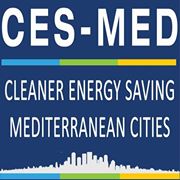CES-MED is an EU-funded initiative set up to provide training and technical assistance support to Local and National Authorities in the ENPI South region, with a view to help them respond more actively to sustainable policy challenges. This effort also involves raising the awareness of the local population with regard to local sustainable policies, knowledge-sharing, and building lasting partnerships between Local Authorities in the EU and in the ENPI South region.
CES-MED operates with a selection of 2 to 3 Local Authorities in the following eight beneficiary countries: Algeria, Egypt, Israel, Jordan, Lebanon, Morocco, Palestine, and Tunisia (EU cooperation with Syria and Libya currently suspended due to the political situation in the countries).
The CES-MED project is set up to:
Preparing the Sustainable Energy Action Plans (SEAPs): support Local and National Authorities in developing and producing a Sustainable Energy Action Plan (SEAP).
Proposing adapted measures to reduce CO2 emissions by 20% in the SEAP from set baseline emissions inventory levels; prescribe Energy Efficiency and Renewable Energy solutions as well as priority projects to undertake.
21 SEAPS were produced and five SECAPs are being done with the direct support of CES-MED through a practical on- the-job-training approach. Many other cities are preparing their SEAPs with guidance from the Project.
Creating a National Coordination Group (NCG): formed of key National Authorities in each partner country, presided by the country’s Focal Point.
Preparing Seven “Recommended National Sustainable Urban and Energy Savings Actions” reports. Each proposing suggestions to facilitate the preparation of SEAPs and funding of municipal projects specified in the plans.
Creating a “SEAP Support Mechanism” (SSM) was established at national level in each country, whereby cities and local authorities are assisted in the preparation of SEAPs, in funding, in implementing the SEAPs actions, and to facilitate adherence to the CoM.
Coordinating with funding agencies and promoting the cities’ readiness to cooperate with development organisations and benefit from funding facilities and grants to prepare SEAPs and possibly feasibility studies and implementing projects.
Holding SEAP training workshops for each city and awareness raising (CAPP) workshop for the 18 cities that have prepared SEAPs. Training of trainers (ToT) workshops are being currently conducted in each country.
Providing a comprehensive “Information Kit” including tailored guidelines for the preparation of SEAPs, manuals to prepare Baseline Emission Inventories, Community Awareness and Promotion plans (CAPP), the “Recommended National Sustainable Urban and Energy Savings Actions” report per country, and COM explanatory documents.
Providing the “Help Desk” support and guidance for selected municipalities as part of the capacity building exercise in preparing the SEAPs and the train-while-you-do preparation of the awareness raising component.
Developing the CES-MED website and regularly updating it in Arabic, English and French.
Producing a milestones publication about the project and the countries covering to give tangible informations, actions, recommendations, achievements and technical data;
As well as producing new visibility material for the project.
Project participation to the COP22: one project side event and participation to 4 other side events in coordination with EC and other concerned stakeholders.
Collaborating with regional energy pro- jects and programmes such as CLIMA-SOUTH, RCREEE, MED-ENEC, ASCIMER, GIZ (KFW), MED-DE- SIRE, JIHA TINOU (Morocco), Tag Sviva (Israel), CPMR Inter Mediterranean Commission and others.
Implementing partners:
-The Joint Research Center (JRC) of the European Commission.
-A Consortium led by Hulla & Co. Human Dynamics KG (Austria)

 Syria *
Syria *